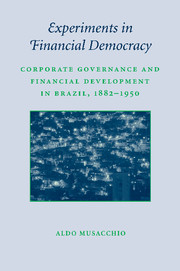 Experiments in Financial Democracy
Experiments in Financial Democracy Book contents
- Frontmatter
- Contents
- List of Figures and Tables
- Preface
- Acknowledgments
- 1 Introduction
- 2 Financial Development in Brazil in the Nineteenth Century
- 3 The Stock Exchange and the Early Industrialization of Brazil, 1882–1930
- 4 The Foundations of Financial Democracy: Disclosure Laws and Shareholder Protections in Corporate Bylaws
- 5 Voting Rights, Government Guarantees, and Ownership Concentration, 1890–1950
- 6 Directors, Corporate Governance, and Executive Compensation in Brazil, c. 1909
- 7 Bond Markets and Creditor Rights in Brazil, 1850–1945
- 8 Were Bankers Acting as Market Makers?
- 9 What Went Wrong after World War I?
- 10 The Rise of Concentrated Ownership in the Twentieth Century
- 11 Conclusion
- Bibliography
- Index
- STUDIES IN MACROECONOMIC HISTORY
9 - What Went Wrong after World War I?
Published online by Cambridge University Press: 30 January 2010
- Frontmatter
- Contents
- List of Figures and Tables
- Preface
- Acknowledgments
- 1 Introduction
- 2 Financial Development in Brazil in the Nineteenth Century
- 3 The Stock Exchange and the Early Industrialization of Brazil, 1882–1930
- 4 The Foundations of Financial Democracy: Disclosure Laws and Shareholder Protections in Corporate Bylaws
- 5 Voting Rights, Government Guarantees, and Ownership Concentration, 1890–1950
- 6 Directors, Corporate Governance, and Executive Compensation in Brazil, c. 1909
- 7 Bond Markets and Creditor Rights in Brazil, 1850–1945
- 8 Were Bankers Acting as Market Makers?
- 9 What Went Wrong after World War I?
- 10 The Rise of Concentrated Ownership in the Twentieth Century
- 11 Conclusion
- Bibliography
- Index
- STUDIES IN MACROECONOMIC HISTORY
Summary
Evidence presented in earlier chapters suggests that activity in Brazil's financial markets first peaked between the late 1880s and 1915 in part because domestic and foreign investors actively participated in the financing of corporations. These investors trusted the financial commitments companies made when they issued securities either because the companies offered strong protections for shareholders or, in the case of bonds, because the legal system protected creditors in the event of corporate bankruptcies. So what precipitated the rapid decline in the stock and bond markets after 1915? How was it that Brazil ended the twentieth century with a high concentration of ownership in large corporations, a corporate landscape dominated by family-controlled business groups, and the government owning and controlling the largest corporations in the country? This chapter and the next one answer these questions, and outline the principal changes in corporate governance and finance after World War I. The current chapter focuses on understanding the decline in financial markets and the main legal changes of the 1930s and 1940s. The following chapter explains the rise of concentrated ownership as a consequence of these changes.
EXPLANATIONS OF THE REVERSAL IN FINANCIAL DEVELOPMENT AFTER WORLD WAR I
This chapter explores, against the evidence presented for Brazil, two broad explanations of why financial development declined worldwide following World War I. The “great reversal” explanation advanced by Raguram Rajan and Luigi Zingales emphasizes the considerable extent to which trade and capital flows influenced the incentives that led domestic industrialist groups to lobby for greater or lesser financial development.
- Type
- Chapter
- Information
- Experiments in Financial DemocracyCorporate Governance and Financial Development in Brazil, 1882–1950, pp. 215 - 235Publisher: Cambridge University PressPrint publication year: 2009


